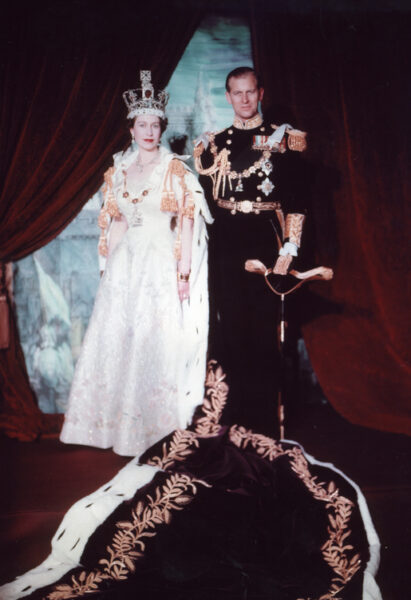In The Critic, Thomas Brian makes the case against a quiet, restrained coronation for King Charles III:

Queen Elizabeth II and Prince Philip, Duke of Edinburgh. Coronation portrait, June 1953, London, England.
Photographed by Cecil Beaton, Public Domain image via Library and Archives Canada reference number DAPDCAP82719.
As surely as the sun rises, the Sisyphean hacks take up their pens. The occasion is the State Opening of Parliament, or some such ceremony, and the audacity of it angers them. A golden throne, polished boots, diamond-encrusted crowns and scarlet cloth. Is it not, they jointly wonder, a bit childish? A bad look? I mean, in 21st century Britain, should we not be more like a grown up country, where all of this procession and pomp and prayer business is left behind? A bit like Germany?
Of course not. Year after year such questions are raised, and year after year, God willing, we shall ignore them. Had you raised this subject with me until this year, I would not be so optimistic. Our country rarely expresses much appreciation for the rich and dignified pageantry that still surrounds so much of our daily life. Yet the unfortunate events of September brought on such an expression of grief, such a wide-eyed fascination and enthusiasm for the ancient rituals of mourning and accession, that I have more faith in Britain knowing and valuing its common heritage. Valued it should be. In an ever more fractious age, what can be more unifying than the binding power of these ceremonies? As we proclaim a new king, we are reminded that the defining feature of “Britishness” is not race or birth, but fealty. Subjects need not have jus soli.
The debunkers denounce such precious things as childish. Even if it were, what shame would it be? The instincts of the child continue to move us with love and wonder. In a letter to the Times last month, a judge described a visit he made to a school where, when he shed the gown and wig, no pupil would believe he was really a judge. In few places is this power of the higher and mystical seen more vividly than in the courtroom. In fact, almost all countries understand this — even grown-up Germany.
When posing as normal people, officials lose their power to move and inspire — whether they wish to inspire trust, or hope, or virtue. States will fail if they are not taken seriously by their subjects. States will not be taken seriously if they do not take themselves seriously. How can we expect any degree of good government, any degree of duty, any degree of seriousness from someone who has so little respect for the service of his country that he thinks its business should be carried out with such casualness that not even a child could be awed into understanding?
For all the virtues of the child, and for all we preserve those adoring childish instincts, it is not we who are childish. That honour goes to the debunker. Perhaps “adolescent” is a better word. These are men who ignore the clear and ready power of the tried and true, the proven, in favour of wordy essays and papers which promise snake oil solutions to the problem of government. What is more a mark of youth than fervour for novel, abstract ideas? What more of a mark of age is love of the proven and experienced? Nothing is more proven, more experienced than the British constitution, with all its pageantry and paraphernalia.



